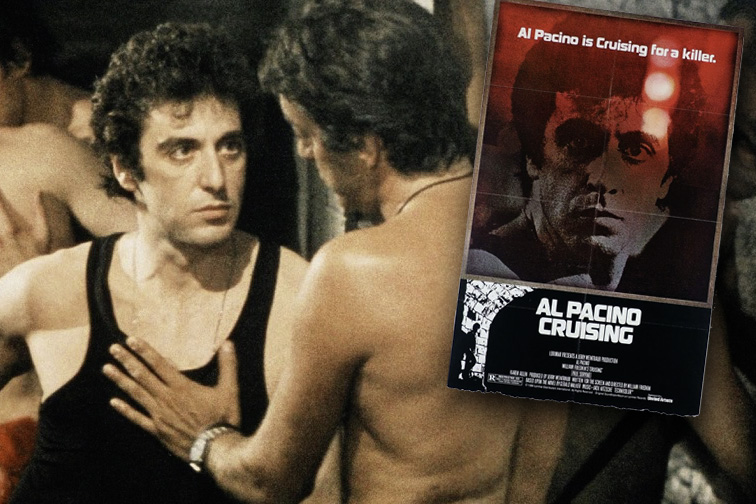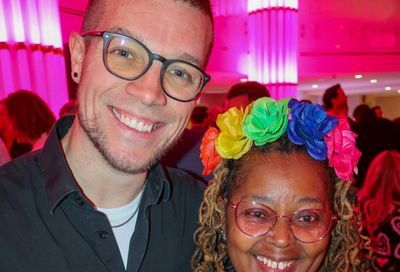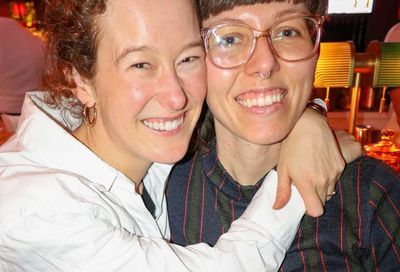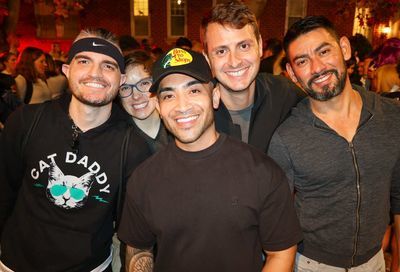I’m Gay (and Married to a Woman): Confronting Sexuality After Saying “I Do”
GAMMA provides support for gay men who are married to women

It’s fitting that Brokeback Mountain served as the trigger for Eric Kearsley to come out to his wife of 28 years.
“I had tried to tell her, over and over again, years in advance, and I’d come up to the brink and just couldn’t do it,” the North Bethesda resident says. “But that movie triggered some honest conversation…. There’s a scene where they meet up for the first time after a couple of years, and his wife sees them kissing. And it was the shock of the wife learning. I think that was the trigger.”
Kearsley, 65, had his first same-sex experience at 14, but due to his conservative, Catholic upbringing, considered his actions sinful. He attempted to suppress his feelings, but had anonymous bathhouse encounters while dating women. Eventually, he met his wife, marrying her in 1977 and embarking on a monogamous marriage. It lasted 20 years until Kearsley, then in the Navy, was abroad in Germany, where he visited a bathhouse. It reignited feelings long since suppressed — and Kearsley wanted to act on them.
Just weeks before seeing Brokeback Mountain, Kearsley’s son, searching for cufflinks, found some condoms in a dresser drawer. He asked why his father would need them, since he had previously had a vasectomy. Kearsley told him that the condoms were old and had just been left around, but secretly wondered if his son had figured out he was gay. The pressure mounted until Kearsley felt he couldn’t conceal his orientation any longer. And so, the “gay cowboy movie” became the impetus for Kearsley to reveal all to his wife.
“She just hugged me,” he recalls. “It was the most amazing thing. She was just so incredibly accepting. The first thing she said to me was, ‘It must have been so hard for you.’ So I think that just says we have a very good relationship.”
Kearsley began attending meetings held by GAMMA, a peer support group for gay and bisexual men who are married or involved with women. Although his wife weighed the possibility of leaving the marriage and separating, she ultimately decided to stay. The couple will celebrate their 39th anniversary this year, although they sleep in separate bedrooms and no longer have a sexual relationship.
“It was not all happy times,” Kearsley says. “There was a lot of crying and a lot of deep, honest thought about what it meant. But when the chips were down, she wanted to support me, and she understood.”
Part of Kearsley’s coming out process was acknowledging that he wanted to begin dating men, something to which his wife agreed. Through his involvement in GAMMA, he began a relationship with “Ashok,” a 64-year-old father of two who has also been married to a woman for 39 years. Kearsley and Ashok’s relationship is celebrating its ninth year, and Ashok has been embraced by both Kearsley’s wife and his children. Kearsley now splits his time between his wife’s house and Ashok’s house, which is only a couple of miles away.
While Kearsley’s story of finding love at GAMMA is rare, the meetings allow gay and bisexual married men an outlet for airing their feelings and sharing their experiences. Formed in January 1978 as the Gay and Married Men’s Association, the group first met in Bethesda, Md., as a response to the Cinema Follies fire on Oct. 24, 1977, in which nine men — many of them married — were killed. The mainstream press at the time was shocked when the victims’ identities were revealed, with a Midwestern minister, a congressional aide, an economist and a former Marine among the deceased, and several more married men among the survivors. GAMMA was formed to ensure that such men had a confidential, affirming, and judgement-free environment to examine their feelings and grapple with the various facets of their sexual orientation.
“GAMMA has a unique position that doesn’t really exist anywhere else,” says Harry Fox, who coordinates local meetings in the Washington area. “There’s no other place a man who’s been in a marriage for 20 years can go to, and meet with men who understand what he’s been through, his story, and have similar experiences of their own that they can talk about.”

Fox, 58, of North Bethesda, knew he was attracted to men at 14 — before the American Medical Association and the American Psychological Association had revised their classifications of homosexuality as a mental disorder. When he broached his feelings of same-sex attraction with adults at 16, they recommended he see a therapist. But Fox was also influenced by his own internal homophobia and stereotypes of gays as promiscuous and incapable of forming lasting relationships.
“I went to Christopher Street and to Fire Island in the late ’70s,” Fox says. “It was a wild, hedonistic time. And one of the things that really influenced me was this book called Everything You Always Wanted to Know About Sex (*But Were Afraid to Ask), which had just the most awful chapter on homosexuality. But at the time, that was on the bestseller list. It painted this depraved lifestyle, and at 14, I said, ‘That’s not what I want for my life.’ Some of the wildness of the ’70s, in my mind, confirmed that.”
Fox later met his wife, revealing his attraction to men on their second date. They married two years later, in 1992. During the interceding 22 years, as societal attitudes concerning homosexuality began to change, so, too, did Fox’s own stereotypes and perceptions of what it meant to be gay. This led to his decision to separate from his wife and live as an openly gay man, although the couple is still legally married. Fox says that just because he came out doesn’t mean his feelings at the time weren’t legitimate.
“I was attracted to her, I was interested in her,” he says. “I loved her and really cared deeply for her…. She is a very good person, a very decent person. We’ve maintained a good friendship.”
Although each GAMMA attendee’s story is different, many share common threads. “Jack,” a 66-year-old from College Park, Md., was born into a very conservative religious family in Missouri and remembers experiencing same-sex attraction as a teenager. However, he remained closeted, particularly during his time in the Navy. After his release from the armed forces, Jack lived with another man for nearly two years. He fell “deeply in love” and began dating a woman 12 years his junior. Jack told his soon-to-be-wife that he was attracted to men before deciding to marry her. He was monogamous until the spring of 2014, when he met a 30-year-old man while traveling in the Midwest, and had a brief fling.
“Part of it was exhilaration, because that that’s really who I was,” he says. “I’ve known at one level, obviously. But it was an ‘a-ha’ moment. This is real, this is me.”
Two months later, he told his wife about the infidelity. They went to couples therapy with an LGBT-friendly therapist, who helped them reach a mutual conclusion that they should separate.
“We are now in the process of a consensual and I would say, even friendly, discussion of how we get to a final divorce settlement,” says Jack. “I still love her deeply, and always will. And I still celebrate the wonderful family we raised together. She will always be family in that sense.”
Ashok, Eric Kearsley’s partner, acknowledges that people can be skeptical of why gay men choose to stay married.
“What people find difficult to understand is the ongoing relationship,” Ashok says. “But what they find more difficult to understand is an ongoing, continuing relationship with one’s spouse, even after one has come out.”
For those who still don’t understand the contours of a married gay man’s relationship, Ashok believes it’s more opaque than someone being gay or straight. “From a theoretical point of view, sexuality is fluid, and the notion of coming out as gay is really a very black-and-white thing. I think the trend is toward accepting people for who they are, and looking for integrity, rather than stark definitions.”
Ashok’s relationship with his wife has been based on “total honesty” and on the durable bonds that have been forged during their marriage of nearly four decades.
“My wife and I don’t live together,” he says. “But we have a deep and abiding mutual relationship, which is based on years and years of shared history, and happiness and joy, as well as difficulties. And history can’t be wiped out, it has to be respected. And we have been able to maintain a friendship over the years that has stood us in good stead.”
GAMMA holds monthly meetings in Washington, Vienna, Va., Sterling, Va., and Frederick, Md. For more information, visit gammaindc.org or meetup.com/GAMMAinDC.
Support Metro Weekly’s Journalism
These are challenging times for news organizations. And yet it’s crucial we stay active and provide vital resources and information to both our local readers and the world. So won’t you please take a moment and consider supporting Metro Weekly with a membership? For as little as $5 a month, you can help ensure Metro Weekly magazine and MetroWeekly.com remain free, viable resources as we provide the best, most diverse, culturally-resonant LGBTQ coverage in both the D.C. region and around the world. Memberships come with exclusive perks and discounts, your own personal digital delivery of each week’s magazine (and an archive), access to our Member's Lounge when it launches this fall, and exclusive members-only items like Metro Weekly Membership Mugs and Tote Bags! Check out all our membership levels here and please join us today!


























You must be logged in to post a comment.